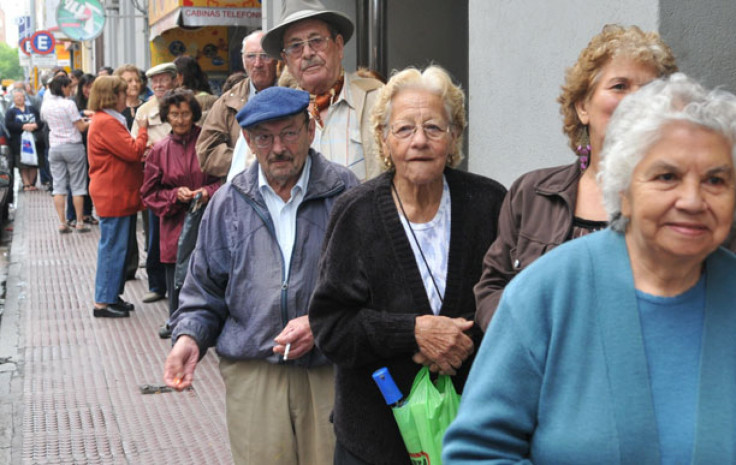In Mexico, Retirees Resort To Informal Jobs To Make Up For Meager Pensions

Ricardo Garfias is a bagger: He bags the products in a supermarket in the upscale neighborhood of Colonia Roma, in Mexico City. Like many others, he makes no steady wages and lives off the customer’s tips. This is a job usually reserved for teenagers trying to make some money. But Garfias is 68 years old -- and officially, he is retired.
Garfias worked in the textile industry for most of his life, and did pretty well. His salary was enough to buy a house and pay for his children’s college. And then, China entered Mexico’s trade, and with its lower prices, Garfias’ job disappeared. “Nobody wanted to pay for nationally produced pantyhose,” he told Spanish newspaper El País.
At 63, Garfias was out of a job and decided to retire a couple of years earlier than the Mexican retirement age of 65. Mexico’s social security granted him 3,800 pesos a month (around $300). With a son still in university, that was not enough, and Garfias had no option but to take the job at the supermarket. Monday to Sunday, for eight hours a day, Garfias bags groceries for a total of some 400 pesos ($30) a day.
Garfias is just one of the thousands of senior Mexicans who, despite paying taxes all their lives, feel obligated to resort to informal work to make ends meet: usually with jobs that they are overqualified for, but no longer physically fit to perform.
And he even belongs to the lucky half: 48 percent of Mexican seniors do not receive any pension, according to the Inter-American Development Bank. Among President Enrique Peña Nieto’s plans, there is the introduction of a universal pension, to reach every Mexican. The amount considered is between 580 pesos ($45) and 1,092 pesos ($85) a month. The reform, one of many currently proposed by Peña Nieto’s administration, was approved by Congress in October.
That's still a meager amount for a population in which 43 percent of people over 60 are living below the poverty line, according to the Mexican Instituto Nacional de Estadística y Geografía (Inegi). “It is a start, and even being so small it will make a difference for a lot of people,” said Enrique Cárdenas, from the Espinosa Yglesias Research Center in Mexico City. “But it will not be enough to have a decent life, of course not.”
The universal pension will reach even informal workers, which in Mexico add up to 60 percent of the population. These people, who do not pay taxes, work in jobs including, for example, food trucks that constitute the formal workers’ everyday lunch, and might see their contribution to society paid back by the universal pension.
The system is not without critics. “The universal pension is necessary, but the way it’s planned, it conflicts with the guaranteed pensions for formal workers currently established as the minimum wage, 1,942 pesos ($145),” said Cárdenas. “That is unfair. The whole system needs to be restructured.”
© Copyright IBTimes 2024. All rights reserved.











